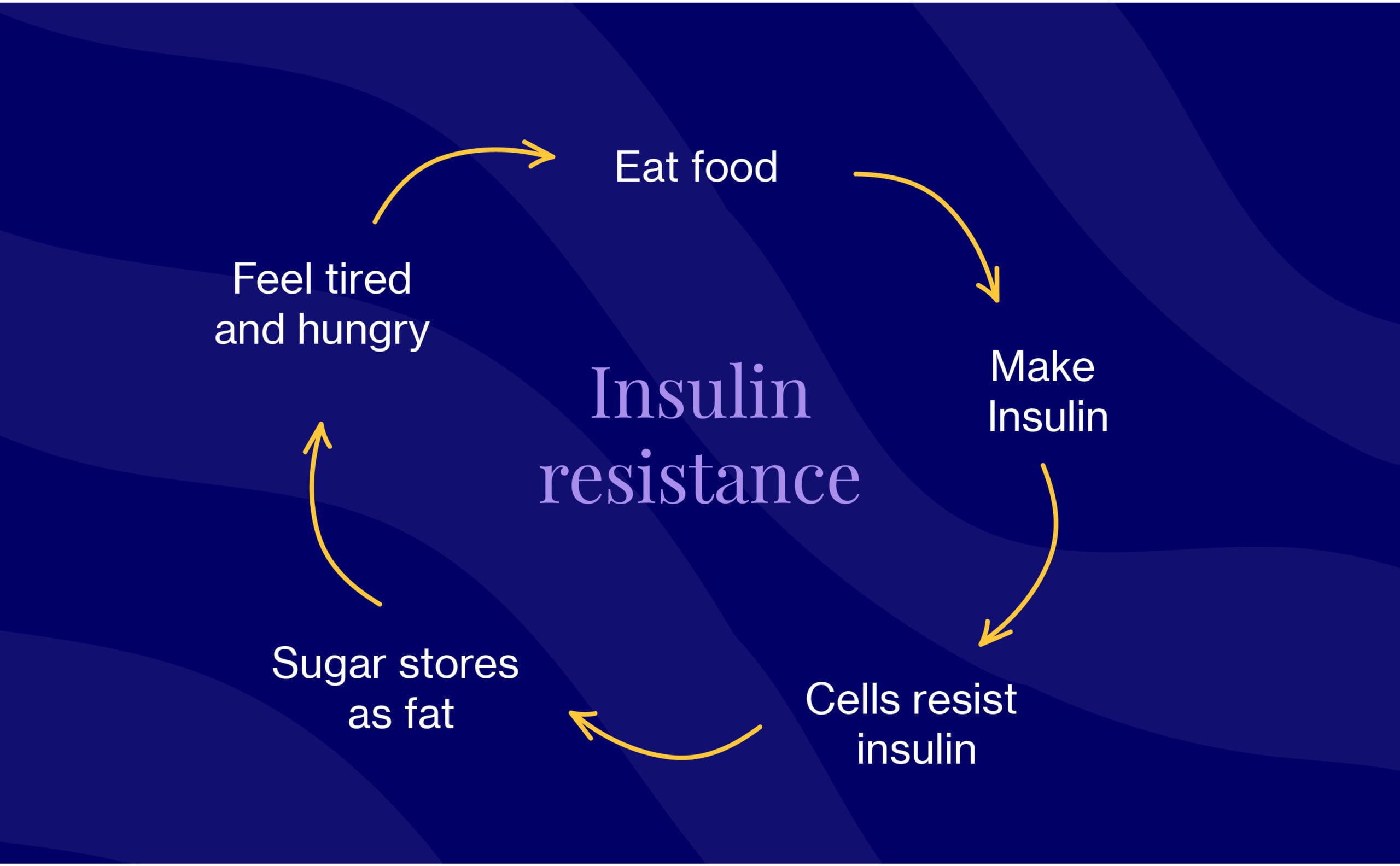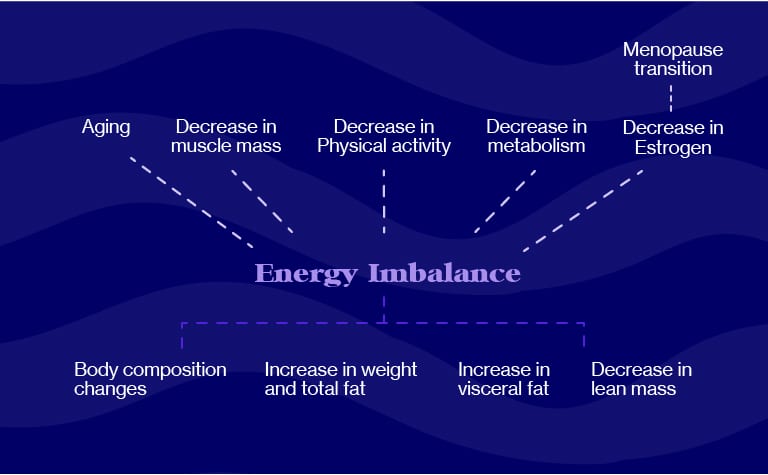We’re all about equipping you with the know-how to understand your symptoms, and we especially emphasize the specific, tangible ways to manage them. Our goal is to empower YOU to take charge of your menopause journey, starting today.
A quick note about product recommendations…Elektra Health is not paid to feature any products. We just like them and think you might too, though we can’t guarantee any results.
Lifestyle
We’re cringing as we write this, because we know it’s the last thing anyone wants to hear, but just bear with us: weight loss always starts with behavioral interventions. There’s no “quick fix” or one-size-fits-all approach, since what works for one woman may very well not work for another (so if someone’s trying to sell you on a quick fix, that’s a major red flag).
What we DO know, however, is that maintaining a healthy diet makes the biggest difference. Exercise is important for all sorts of health reasons, and needs to be part of everyone’s routine, but diet is THE key player in weight loss. You need to start by changing what you eat, how much you eat, and even when you eat.
The science is clear: You can’t out-exercise a poor diet.
The key is to find a solution that 1) is sustainable given your lifestyle, and 2) is effective for YOU.
Elektra Health is all about optimal health and healthy living, which includes eating, moving, and getting enough sleep. We work with women to build treatment routines to help curb several of the root causes of weight gain, including hormonal changes and lifestyle decisions. Want to dive deeper? Book time with one of our specialists to get your questions answered.
Nutrition & Diet
Here’s our science-based take on the various diets and weight loss theories out there (and for more info on nutrition during menopause, check out our guide):
Mediterranean diet.
While there isn’t one best diet for everyone, the Mediterranean diet has rightly earned a lot of hype for its positive effects on everything from mental health to weight loss. It’s low in saturated fats and animal proteins, rich in antioxidants and fiber, anti-inflammatory, low-carb, and low-sugar. And because it kicks most refined and concentrated sugars to the curb and focuses instead of non-starchy veggies, legumes, fruits, and whole grains, it’s considered a “low-glycemic index” diet — meaning it won’t dramatically spike our blood sugar. Because remember, increased glucose leads to increased insulin, which leads to weight gain.
Keto
This “diet” relies on eating mostly fat (at least 55-60%) and fewer carbs (<10 grams), which means lots of olive oil, fatty fish, avocados, and nuts. While those are certainly all healthy, beneficial foods, keto can skew heavily towards animal proteins, including meat, cream/dairy, and processed fats which, long-term, aren’t great for us. By limiting carbs, your body will switch over to ketosis, which means it turns to burning fat stores for fuel. So while the diet can be very effective for initial weight loss — as well as energy and clarity — it is difficult to sustain, and most of us who do keep it up aren’t eating sufficient fiber and plant-based foods.
Low-Carb
Also known as the “doable Keto,” low-carb can be effective for weight loss. There’s no hard and fast definition of a low-carb diet, but usually this involves limiting daily carbohydrate intake to around 50-150 grams. And the carbs you’re eating are mainly from vegetables, and most pasta, breads, and sugary sweets are avoided. This has been shown to be effective for weight loss, and it actually helps to decrease appetite (also good for weight loss!). Low-carb has other health benefits as well, including lowering blood sugar, blood pressure, and triglycerides, which are a type of fat found in your blood, that, if levels are too high, can contribute to the hardening of your arteries. This hardening of the arteries’ walls can increase risk of stroke and heart disease.
“Calories in” vs “calories out” theory
Generally speaking, it is true that if we consume a much higher amount of calories than we expend, that energy surplus will be stored in our bodies as fat. But that is not the whole story (we repeat: NOT the whole story). It’s just as important to pay attention to where those calories come from, their nutrient content, and the way a particular food influences our blood sugar and hormones such as insulin. In other words, our bodies don’t process 100 calories from an apple like they do 100 calories from a chocolate chip cookie.
Intermittent fasting
Elektra’s founding physician, Dr. Anna Barbieri, MD, likes intermittent fasting (IF) for its numerous benefits — namely sugar control and weight loss — however, some see more benefits from it than others (yet another reason why diet isn’t one-size-fits-all). In order to see results, a 16:8 schedule is recommended, which means 16 hours of consecutive fasting during a 24-hour period. Fasting hours include sleeping hours, so many find this to be a doable schedule (for example, eat between the hours of 12:00PM – 8:00PM, and fast overnight until noon the next day). During the fast, you can have things that don’t raise insulin at all, like water, coffee, tea and fat (for example, coffee with butter).
It can help to start with a 12:12 schedule, when you fast for 12 hours, and work your way up to 16:8. There are other IF regimens as well, like alternate day fasting and a 5:2 fast, where you limit intake to 500 calories or fewer every other day, or two days of the week. Regimens that involve fasting for more than 1 day per week should be done under the supervision of a physician or registered dietitian.
Think of IF as less like a “diet” per se, and more like an eating pattern which, when done correctly, can lead to numerous health benefits, including shedding weight, reducing inflammation, supporting heart and brain health, etc. For weight management, IF is probably the easiest intervention and is even more powerful when combined with what we eat (plant-heavy, no added sugars) and how we eat (portion control).
To summarize, there’s no one perfect menopause diet. But Dr. Anna Barbieri recommends you choose WHOLE unprocessed food, mostly plants, no added sugars, healthy fats, and “lots of green stuff.”
“I’ve seen women transform their menopause experience for the better by changing diet. It takes work, but the payoff is big.”— Dr. Anna Barbieri, MD
READ MORE: The 101 On Intermittent Fasting During Menopause
Holistic Practices
Mindfulness is a powerful tool in preventing “stress eating,” which is something we all do now and again (after all, we’re only human!). Studies have shown that improvements in mindfulness and chronic stress impact cortisol levels, which are associated with reductions in belly fat over time. Go-to mindful eating tips include:
- Sitting down at a table (no eating on-the-go!)
- Removing distractions such as TVs, tablets, or computers (which make us less aware of how much we’re eating)
- Controlling portion sizes by eating from a plate vs straight from the box or bag
- Putting down utensils between bites
Additionally, we’re big fans of flexing the self-love muscle. Next time you look in the mirror, tell yourself that you love yourself. However silly it may sound at first, trust that the way you speak to yourself impacts your perception of self. The more you do it, the easier it’ll get, just like any habit.
Exercise
No one wants to hear this, but regular exercise and physical activity is important for addressing weight gain, and is also critical for overall health. If the tried-and-true exercise routine that you’ve been loyal to for years doesn’t seem to be, well, doing anything for you right now, it may be time to switch things up — or up the intensity. We specifically recommend strength training, which aids in maintaining (and building) muscle mass to increase metabolic rate. Our favorite is Fitnessblender.com.
But of all the workouts out there (of which there are many), the best one is the one that YOU like and that fits into your lifestyle. It has to be fun — or at least tolerable — otherwise you won’t want to do it! If you aren’t finding any joy in your workouts, maybe it’s time to admit that and think about ways to move that aren’t a chore (Zumba, anyone?). Check out those virtual exercise classes that you’re intrigued by, but haven’t tried yet. Or, team up with a friend for some company and accountability.
READ MORE:
Supplements & Medical Therapy
There are lots of supplements and blends which are marketed for weight loss. Unfortunately, if they sound too good to be true, they likely are — weight loss is not found in a bottle. Some contain excessive amounts of caffeine, for example, which could cause side effects. If you consider any specific weight loss supplements, we recommend that you discuss with your doctor.
If you’re struggling with a lot of weight or have been unable to lose weight despite multiple trials, weight loss specialists (yes, obesity medicine/weight loss medicine is its own thing now!) may offer solutions, including both pharmacological and surgical. You can look for a physician specially trained and board-certified in weight loss here.
We’re always keeping an eye out on emerging research and the latest clinical studies. Subscribe to our weekly Elektra Digest for the latest, science-based info direct to your inbox. Something work well for you that’s not listed here? We want to hear it! Shoot us a note at [email protected]. (We’re human, promise.)
Pro tip #2
Make a deal with yourself when sitting down for a meal. Eat 80% of your food, then take a five-minute break. Still hungry? Keep eating. If not, save the rest for leftovers. This trick will give your brain time to catch up with your stomach, which may very well have had enough. In fact, usually when you feel 80% full in the moment, you're actually 100% full.
Pro tip #3
Since food and healthy eating play a huge role in weight loss, meeting with a Registered Dietitian (RD) can be helpful. RDs are licensed professionals who earn a bachelor's degree and pass a board certification exam. (Nutritionists, on the other hand, can have a wide range of education but may not need certification depending on the state.) Before you see someone, be sure to check their credentials. We're also big fans of Noom, an app-based holistic weight loss platform.
Disclaimer: This information is for general educational purposes, and should not be used as a substitute for medical advice, diagnosis, or treatment of any health condition or problem.
As with anything you put into your body, taking dietary supplements can also involve health risks. You should consult a medical professional before taking supplements and inform your doctor about any supplements, as well as any medications you already take, since there may be interactions.
Helpful? Share the wealth!
Share with a friend who deserves evidence-based expertise &
solutions.







